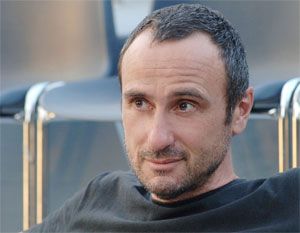|

Giorgio Barberio Corsetti | |
There are three major lines in this opera; the love triangle between Don Carlo, Filippo and Elisabeth (or probably even a love square because there is Princess Eboli), and there is a political conflict and the religious theme too. Which line is most important for you?
The first impression I had from this opera was the darkness... It’s a very dark opera and any of these three passions – I see them as passions – complicate the relationships between the characters. Elisabeth who was promised to be married to Don Carlo suddenly becomes his stepmother, there’s a kind of incest.
There is this relationship between the father and the son, it’s very oppressive. Filippo oppresses Carlo who has to fight for his independence.
There is also friendship in the opera – that’s another kind of love. The friendship between Rodrigo and Carlo is very important.
Carlo is oppressed. As soon as he can lift his eyes up he discovers his love. Then he looks around and sees the enslaved Flemish people of whose freedom Rodrigo dreams. Their freedom becomes his only hope because it also means freedom from his father and his royal power. And it’s very strange because Carlo is the dauphin, he should be the King after Filippo. He is a king against kingship.
The political line in the opera is a complete nightmare: it combines the struggle for the freedom of the Flemish people, the complex relationships within the royal family and religion, which brings another level of oppression. Even the coronation day becomes a day of grief because the heretics are burnt. At a certain moment the celebration for all the people becomes a terrible event with deaths and prisoners. The finale of the opera is very enigmatic: in the darkness the ghost of King Charles V appears, and he speaks of an era when power disappears and eternity remains, tempus fugit, aeternitas manet.
It’s an opera with an open end...
Yes, an open end, an end without end. We don’t know what happens to Carlo. If he’s killed, if he dies, if he disappears somewhere. We don’t know where this phantom of the King takes him, but we take it for what it is. That’s how Verdi depicts this historical nightmare. I’m not trying to tell you a real story of what actually happened. I’m talking about how I sense the story, and I think it’s interesting because we have this freedom of interpretation when you start to play with these characters, change their relationships and put them in this or that situation... That’s why, in a way, I decided to have very historical costumes. Invented, because they are not strictly historical, but they are the taste of the time in which Verdi’s opera is situated.
I noticed that the costumes in the production are luxurious and historically accurate, while the sets are very laconic and symbolic. They are really concentrated and not descriptive of the age.
No, not a historical description but a kind of sign, a way of thinking, a way of dreaming about the opera. I didn’t want to represent it as a kind of reconstruction, so for instance Fontainebleau Forest becomes a kind of black, moving and unreal world, and its constant movement accompanies the characters. The darkness moves with them. There are many portraits, at the end of the 16th century, where the back is all black. Or just a few stage curtains, a bit of drapery, all in dark tones. That’s because the painter, at that moment, wanted to put this figure not in a special time but in eternity, in suspension. And this is the black we used. And I like the idea of having this kind of space which will oblige the people to go down the stage, so it creates a relationship of strength and weakness or other relationships between the characters. And then I decided that I didn’t want to have hierarchies with the costumes – bishop, archbishop, cardinal... Just to have monks. And at some point the monks become monsters...
Ugly faces, ugly voices...
Almost Hieronymus Bosch. For Verdi, in this opera, religion and the Church was a nightmare, with the blind Grand Inquisitor who himself represents darkness. He’s blind with the blindness of someone who doesn’t see the world as it is and being in St Petersburg and listening about the Grand Inquisitor is very strong because suddenly I thought about The Brothers Karamazov and those fantastic pages by Dostoevsky.
Yes, the atmosphere of Dostoevsky’s novels is also dark, sometimes nightmarish, phantasmagorical...
So you want to underline the unreal or even surreal character of the opera?
It’s not completely unreal, the opera is connected with reality. In part it’s an historical opera, but much of it contains inventions. It was also based on the play by Schiller, so it’s an invention of an invention. There’s an opinion that an opera libretto is a kind of summing up of a play. After Don Carlo I’m working next on Macbeth, again with Gergiev at La Scala. Macbeth is also very synthesised from Shakespeare’s play. The libretto has the main dramatic lines, but some aspects are exaggerated.
What do you think of Verdi? Besides Don Carlo and Macbeth you also worked on Falstaff...
I’m still discovering Verdi. And, you know, for me I have a strange relationship with texts written for the theatre, because I think a lot about when, where and by whom they were written.
But when working on an opera I take it as a world in itself. It’s strange, but Falstaff was Verdi’s last opera and the first work I staged by that composer... And it was so perfect, the relationship between music and theatre! Here in Don Carlo as well this relationship is very strong. But here it’s more within a certain theatre convention. That’s also interesting. An opera, however laden with circumstances, can always be staged. But it has its own laws, while Falstaff has complete freedom, it goes beyond any pattern; it’s funny, it’s tragic, it’s melancholic and it’s ironic and it’s about otherness as well. It’s about old age, written by two old men.
But you’d never say that Verdi wrote the opera when he was in his eighties. Don Carlo is also a “young” opera although when he wrote it Verdi was sixtyfour years old…
That’s the character he chose, it’s a young guy, a young man, Don Carlo. And he finds it hard to see his place in the world, even if he is the son of a King... It’s very touching, it’s a very powerful plot. I fell in love with this opera by Verdi. In Macbeth all the dark side is here, and the history, the historical reality, it all disappears, it has to do with killing and blood; a political motif descends into a world of the irrational, nightmares...
Which of the opera’s characters is most interesting for you – maybe Don Carlo or perhaps the Grand Inquisitor?
Don Carlo is, in a way, a kind of Hamlet, but he’s different from him, he’s just a prisoner of love. Hamlet doesn’t know how to manage a situation that is so terrible and Hamlet is not stupid enough to kill at the beginning, he’s too intelligent. In a way Don Carlo is the victim of circumstances. He’s sensitive, he believes in love, and he can love, and so he’s in an affinity with Elisabeth, they are made for each other. And yet they cannot be together.
He seems a romantic character, more from the 19th century than from the 16th by origin. Like a contemporary of Schiller...
Yes, but with Verdi he’s more a sensitive than a romantic character. I believe he’s fighting for freedom for Rodrigo and so he can’t attain love. So it’s just an enforced choice. He’s no rogue. But Rodrigo is in a way a rogue, though he’s also an intelligent politician, he doesn’t hesitate to become a friend of Filippo because he knows it’s good for his purpose, so his heroic battles are diplomatic, he has a political mind, but not in a bad sense.
He wants to do everything good for Don Carlo, Filippo, the country... What do you think about Filippo, because we consider him as a kind of villain, but Verdi gave him a lot of beautiful music...
There is a moment in Act IV when he’s alone, that’s fantastic. Suddenly that point becomes a total reflection of his age, old age comes and time passes, and he has a sense of power. He’s a controversial character, it’s not only one-way. In a dialogue with Rodrigo in Act II he’s very sincere. He says power must be like this and Rodrigo doesn’t agree with him. The King agrees that he loves to talk with sincere people, but then warns Rodrigo that he should be wary of the Grand Inquisitor, a warning that is true also for himself. So it’s realism, the political realism of the character of Filippo. But then, in the dialogue with Rodrigo, in Act IV Filippo has an insight, he’s a rounded figure we can see from many angles. There are no completely good or bad people...
You said you think Don Carlo is a very modern character. What about the whole opera, does it belong to its time? What will the contemporary audience find here? What eternal problems does it touch upon?
Yes, because there are eternal problems, the relationship with power, the relationship with the father and the relationship with history. It’s stronger than us, sometimes. At that time it was the power of the King and the power of the Church, now it’s the power of the banks, financial concerns.
Times change but the problems are the same.
Yes, the power of the economy and how it can create a crisis that puts millions of people on the road. It’s something that people can feel, the history, the changes, but in a way very often there is a situation where they don’t care about other people.
Speaking with Nadezhda Koulygina
|
